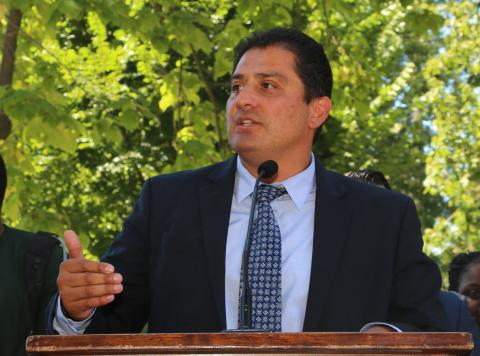Senator Ben Hueso represents District 40, a region that incorporates some of San Diego County and all of Imperial County.
In January 2017, Hueso was reappointed to serve as Chair of the Senate Committee on Energy, Utilities and Communications.
The Wildfire Preparedness and Response Legislative Conference Committee passed legislation SB-901 in August to further address the wildfire crisis and give the California Public Utilities Commission (CPUC) some direction forward.
I sat down with Hueso at the IVP conference in Hawaii to discuss the legislation passed and the changes that will likely be coming for ratepayers.
Energy Programs Likely To Be Reevaluated
"These programs have a net effect of about $700 million statewide." ~ Sen. Ben Hueso
An emerging story from the devastating wildfires is that California needs to cut costs to update its grid. For a state as large as California, that's an expensive proposition that experts say, "simply needs to be done."
So, what will these changes look like for ratepayers?
Hueso told me there will be three areas where subsidies will likely be reevaluated:
Low Rate Payer subsidies, Rooftop Solar subsidies and Environmental subsidies.
These programs have been costing California ratepayers at least $700 million annually. "There are programs that we love that we're going to likely be reevaluated and it's going to be a question of what's more important. These subsidies have a net effect of about $700 million statewide. And if you spread that out to the ratepayers, we're talking about money that adds up."
Changing the way Sacramento does its energy business appears to be on the table, "We're going to have to change the way we do business in California. The new normal requires that we strengthen the grid, which is expensive. It's also going to require the legislature to go back and revisit the programs that we run in the state that has an impact on what ratepayers pay."
Taking On The Environmental Lobby
Environmental protection issues have also been raised, particularly as it relates to maintaining forests, something critics like to point to as one of the reasons California fires have become increasingly devastating.
Hueso said if maintaining the forests is done aggressively and properly it could be a big win for the state. "That money could go to improvements to the system, replacing the power poles, under-grounding. We may look at where this is cost effective. A lot of these power lines require the removal of forests, so maintaining the forests is critical. If you don't maintain, get rid of the dead wood, you're asking for trouble."
SB-901 allows for the PUC to be a little more aggressive in granting utilities the money needed to properly maintain their system. It's a juggling act between the PUC and utilities, one focuses on protecting ratepayers, the other on their bottom line.
The legislature will decide what to do with the $700 million or so if these programs are removed.
"SDG&E Model For Rest Of State"
"there is nothing that our legislation did to help the utility. In a case where they were negligent or involved they would pay for the damages." ~ Sen. Ben Hueso
San Diego last had a devastating wildfire in 2007. The Witch Creek Fire burned more than 240,000 acres and led to the evacuation of about 500,000 people. Hueso noted, "San Diego has been able to reduce the events significantly. We started working on this over 10 years ago in San Diego, and it's proven to be very successful."
Hueso pointed out SDG&E has implemented a state-of-the-art weather center and camera system and in coordination with helicopters, that respond the minute a fire breaks out, has dramatically reduced events.
The utility has also implemented shut off periods, something Hueso said is being looked at statewide: "Shutoffs are now a regular part of the playbook in San Diego. We may allow shutoffs in other parts of the state now. In periods of extreme weather conditions. In San Diego, it's extremely disruptive of people's daily lives, but in the end, we think it's worth the safety piece outweighs the inconvenience piece."
